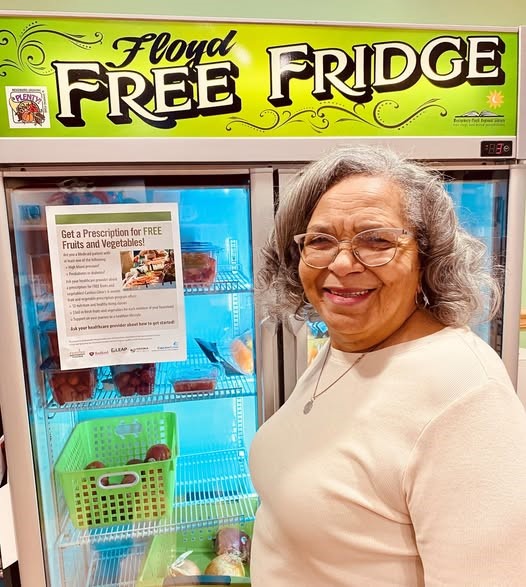
A volunteer who helps the partnership between the Plenty! Farm & Food Bank and the Jessie Peterman Memorial Library in Floyd, Virginia, USA, keeping strong.
Every Summer since 2023, the I Partner With My Public Library Award invites public libraries to recognize the accomplishments of exceptional partners.
Winners for 2025 are (Click the links to learn more about the winners):
- Beaver Valley Outreach, nominated by The Blue Mountains Public Library, Ontario, Canada
- Boone County Parks Department, nominated by Boone County Public Library, Kentucky, USA
- Colorado State University Department of Occupational Therapy (CSU-OT), students and faculty, nominated by Poudre Libraries, Old Town Library, Fort Collins, Colorado, USA
- Community Action, Inc. of Central Texas, nominated by San Marcos Public Library, Texas, USA
- Geezers in Sneakers Getting Coffee, nominated by Orono Public Library, Maine, USA
- LivingRoom Community Art Studio, nominated by Oshawa Public Libraries, Ontario, Canada
- Mackenzie Health, nominated by Vaughan Public Libraries, Ontario, Canada
- Plenty! Farm & Food Bank, nominated by Jessie Peterman Memorial Library in Floyd, Virginia, USA
- The Sharing Place, nominated by Orillia Public Library, Ontario, Canada
- Valley Program for Aging Services, nominated by Waynesboro Public Library, Virginia, USA
Below you can read detailed descriptions of every Awardee.
We also invite you to watch the online Awards Ceremony held Friday, November 14.
Look for the 2026 call for nominations to open on June 1, 2026.
Learn about previous awardees as the webpages for the 2024 I Partner with My Public Library Awards and the 2023 I Partner with My Public Library Awards.
You can also learn more about this effort in this article published on OCLC/WebJunction.
Beaver Valley Outreach
The Blue Mountains Public Library (Ontario, pop. 7,025) partners with Beaver Valley Outreach (BVO) to deliver accessible, senior-focused programming and referral services. The partnership began in 2018 and builds on earlier collaborations that date back to 1995, combining the library’s space, publicity, and tech support with BVO’s community ties and program delivery. Together they create dependable, low-barrier opportunities for seniors to access information, social time, and practical supports.
 Some of the ways these two partners collaborate include:
Some of the ways these two partners collaborate include:
- Co-hosting and venue-sharing: Beaver Valley Outreach (BVO) runs senior-focused programs while the Blue Mountains Public Library (BMPL) provides space, event coordination, registration, tech support, and publicity — effectively enabling BVO to run more and larger programs than it could on its own. The partnership creates a dependable, low-barrier place for seniors to get reliable information on practical, sometimes sensitive topics. Programs regularly fill up and have included sessions on fraud prevention, medical assistance in dying, navigating healthcare, winter safety, and tech help. The partners also co-sponsor larger events such as a Seniors Active Living Fair and a Volunteer Awards & Recruitment Fair.
- Division of labor by strength: The two partners meet in person twice monthly and maintain regular email communication to plan responsive programming. Their long-term sustainability depends on mutual trust, regular planning meetings, clear role division, and complementary resources (BMPL’s infrastructure + BVO’s community ties). Through this, the organizations have become central players in local aging-in-place efforts; they leverage complementary strengths to deliver consistent, dignified, responsive services that neither could deliver as effectively alone.
Impacts from this partnership include:
- Reduced social isolation and stronger social ties: Events provide social time before and after sessions. Attendees form new friendships and some go on to volunteer. For example: a tech-help session attendee later volunteered to assist others because the program gave him “purpose and a way to give back.” Another community member said bluntly: “If it wasn’t for these events, I’d have no reason to get out of the house some weeks.” — a vivid example of how the programs reduce isolation.
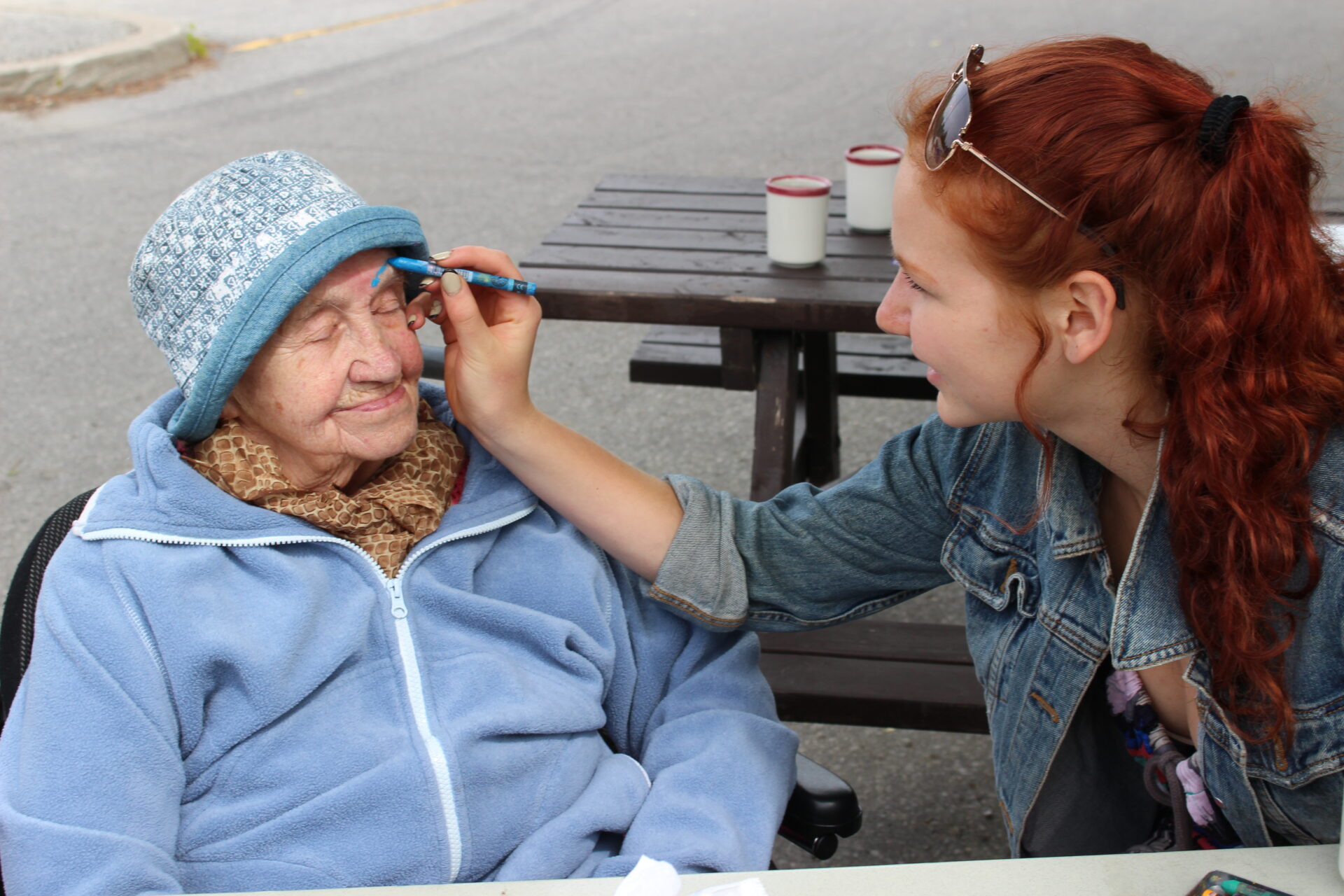 Improved service coordination and reach: Large fairs bring together many local service providers, raising community awareness of aging-in-place resources and creating momentum around senior wellbeing. When the partners hosted a last-minute session on winter safety in between a series of snowstorm warnings, the partners not only helped spread the word quickly, they also arranged for volunteers to call seniors without email to make sure they knew about it.
Improved service coordination and reach: Large fairs bring together many local service providers, raising community awareness of aging-in-place resources and creating momentum around senior wellbeing. When the partners hosted a last-minute session on winter safety in between a series of snowstorm warnings, the partners not only helped spread the word quickly, they also arranged for volunteers to call seniors without email to make sure they knew about it.
Summing up the collaboration, the library wrote in its nomination letter that: “they are one of our most dependable and low-maintenance partners. They show up prepared, communicate clearly, and share the work. Over the years, we’ve grown from occasional collaborators into true partners. Their ability to connect with people, combined with the library’s resources, has made this partnership something bigger than either of us could accomplish alone.”
Boone County Parks Department
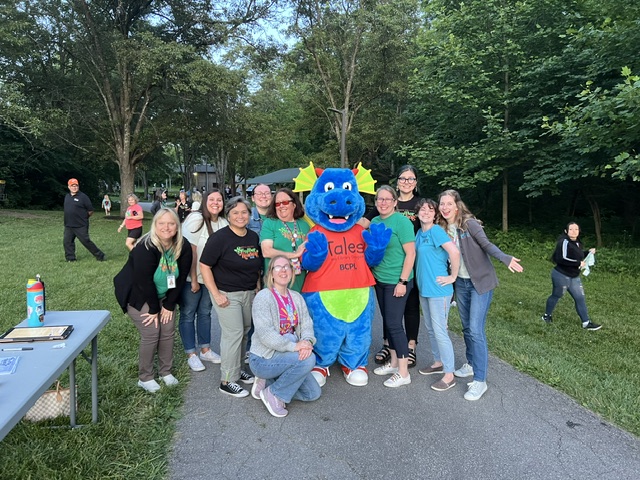 Boone County Public Library (Kentucky, pop. 144,135) partners with the Boone County Parks Department in a 25+-year collaboration that brings library programming into park spaces, increasing access for families, seniors, and rural residents. The partnership combines parks’ site & logistics expertise with the library’s literacy and cultural programming to create recurring community events like StoryWalks®, Summer Concerts, and Family Nature Days.
Boone County Public Library (Kentucky, pop. 144,135) partners with the Boone County Parks Department in a 25+-year collaboration that brings library programming into park spaces, increasing access for families, seniors, and rural residents. The partnership combines parks’ site & logistics expertise with the library’s literacy and cultural programming to create recurring community events like StoryWalks®, Summer Concerts, and Family Nature Days.
Community impacts
- Increased access and reach: bringing library programming into parks reduces transportation barriers and reaches families, seniors, and rural residents who might not visit library branches.
- Connecting literacy and parks: Storytimes, StoryWalks®, and the Summer Reading Kick-Off engage hundreds of families annually and encourage children to read more.
- Social & wellness benefits: outdoor concerts, nature days, and trail activities promote physical activity, community gathering, and intergenerational connection.
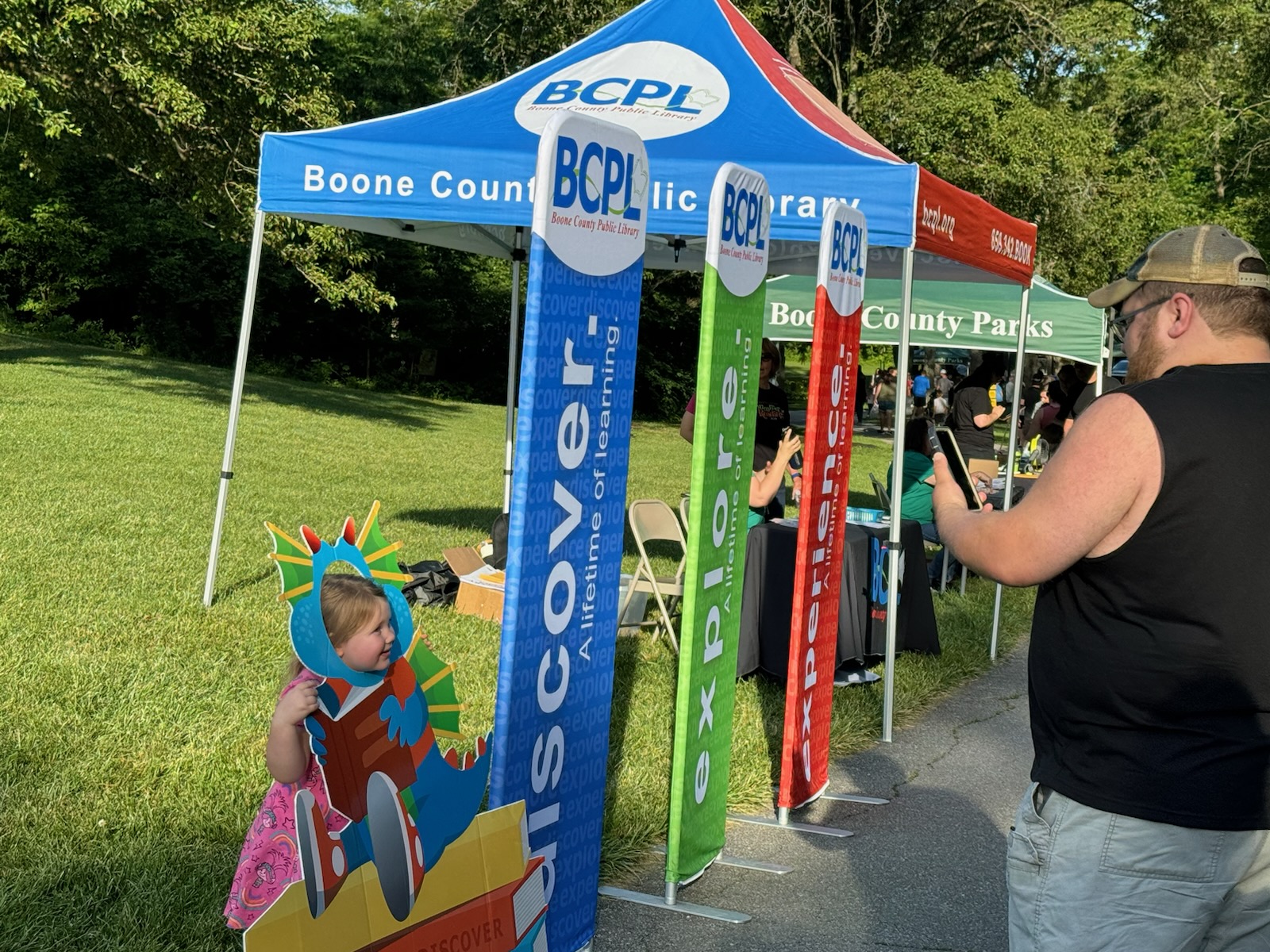 Partner impacts
Partner impacts
- For the Library: Expanded visibility, new audiences, and the ability to deliver literacy and cultural programming outside branch walls.
- For Parks: An enriched programming lineup, broader park use, and stronger community draw (events bring more visitors to park facilities).
- Shared organizational benefit: Efficient use of limited resources. For instance, Parks handled StoryWalk production/installation at the new Hebron branch at no cost. Through the collaboration there is stronger cross-agency trust, and a durable model for public service collaboration.
- Concrete participation numbers cited in the nomination letter include weekly Storytime crowds (40+ each Thursday in summer), Storytime/park participation totals (300+ children & caregivers annually), 500+ families at Summer Reading kick-offs, ca. 900 at “Touch-a-Truck,” ca. 300 for Family Nature Day, ca. 100 for Family Fun Nights, and ca. 300 people per concert across 12 concerts.
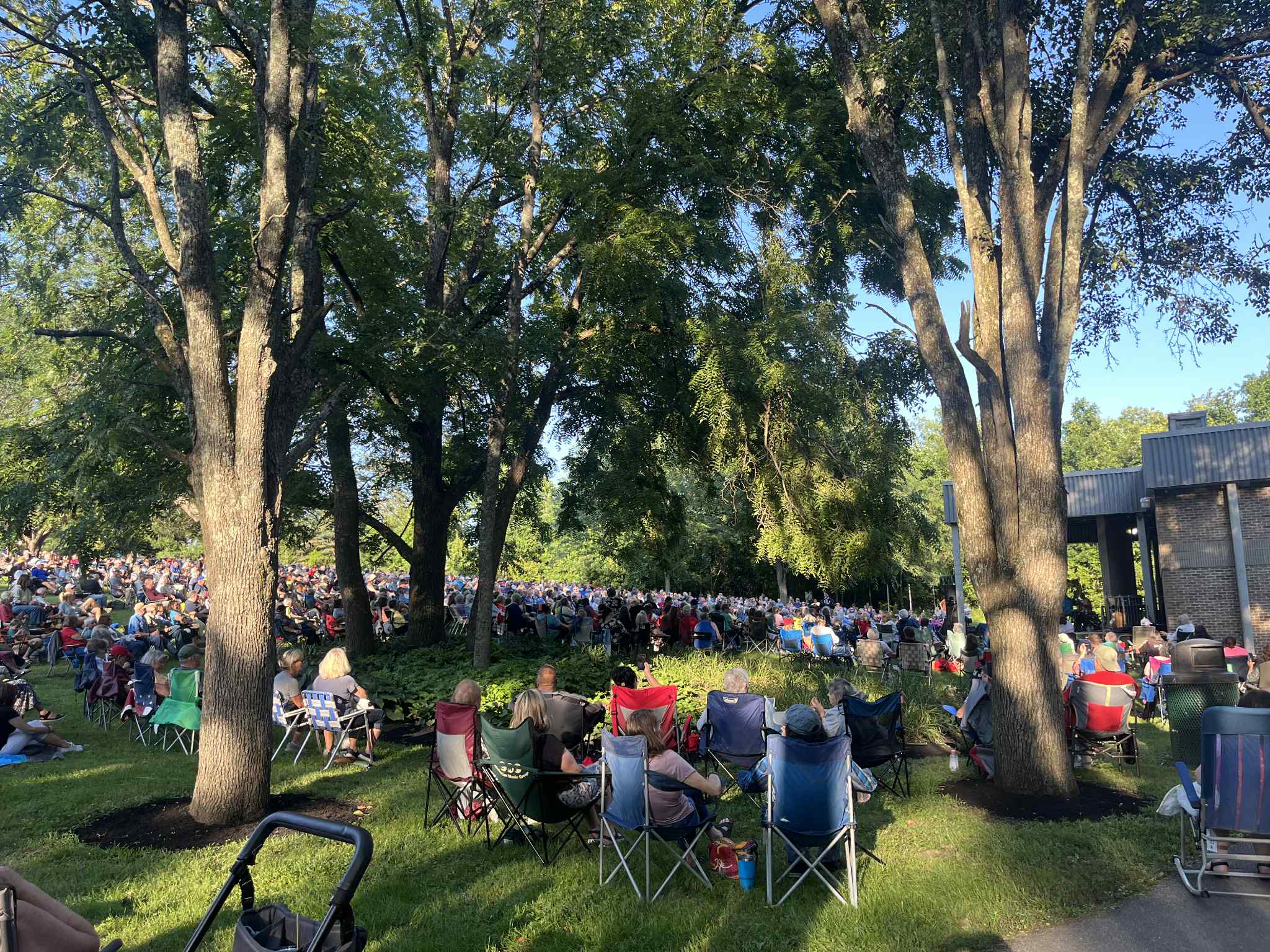
- Summertime Concerts as a jointly created community ritual: Concert nights draw hundreds and are described as becoming a summertime tradition for families, seniors, and neighbors — a cultural glue moment that shows the partnership’s social value and legacy in the community.
Notable project: Hebron Branch StoryWalk® build-out (2019): When the Hebron branch opened on a 50-acre site, Parks staff enthusiastically designed and installed a StoryWalk® at no cost — they visited the site, helped with layout, produced and mounted signs, while the Library provided story content and activities. Now parents and grandparents report children eagerly “rush to the next storyboard,” showing how StoryWalks® combines movement and reading.
Embedding library programming into public spaces through community partnerships reduces barriers and creates new community rituals.
Colorado State University Department of Occupational Therapy

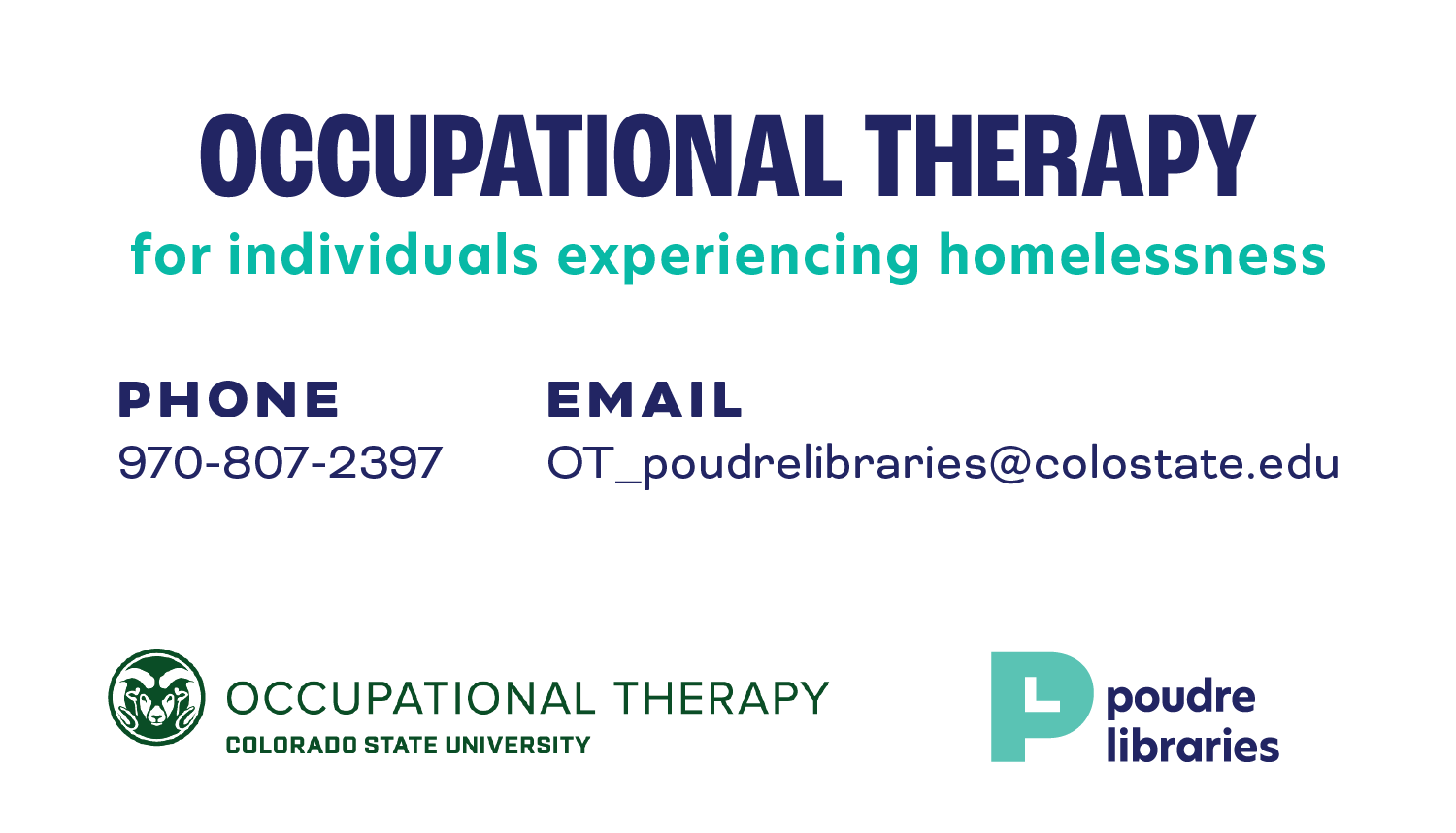
 Poudre Libraries (based in Fort Collins, Colorado, population served 170,924) partners with Colorado State University (CSU) Department of Occupational Therapy (OT) to embed graduate OT students and faculty at the library, delivering on-site clinical services, staff training, and workforce support that benefit vulnerable patrons and provide hands-on fieldwork for students. The program began in 2023 and expanded across 2024–2025 based on observed impacts.
Poudre Libraries (based in Fort Collins, Colorado, population served 170,924) partners with Colorado State University (CSU) Department of Occupational Therapy (OT) to embed graduate OT students and faculty at the library, delivering on-site clinical services, staff training, and workforce support that benefit vulnerable patrons and provide hands-on fieldwork for students. The program began in 2023 and expanded across 2024–2025 based on observed impacts.
CSU’s Department of Occupational Therapy (led by Prof. Bianca Daugherty) places graduate OT students and faculty on-site at Old Town Library to deliver direct services (drop-in hours, 1:1 sessions, and recurring groups like “Workforce Wednesdays” and “Fun Fridays”). The library provides space, materials funding, and stipends. CSU-OT provides clinical services, staff training, program design, and creative problem-solving.
This partnership is among the first known collaborations between an academic OT program and a U.S. public library.
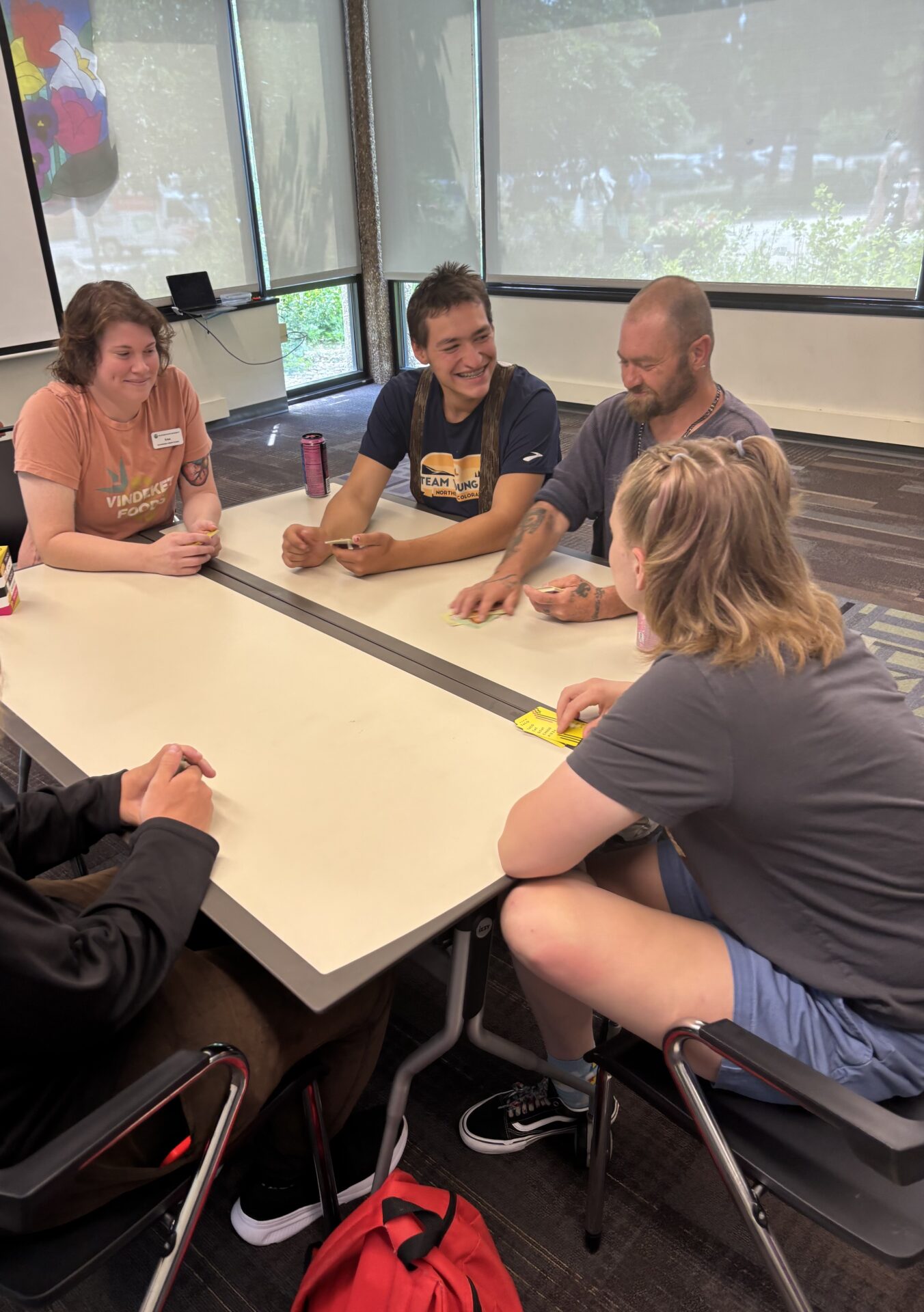
Impacts. From January to July 2025 CSU-OT spent about 1,500 hours at Old Town Library and saw 82 clients in 1:1 and group work. Earlier in Summer 2024 two Level II fieldwork students and faculty delivered 480 hours, worked with 47 individuals individually and 77 in groups.
Many clients received immediate, practical help on topics including job-searching, housing navigation, digital skills, and mindfulness.
Through this partnership, vulnerable patrons (people experiencing homelessness; adults with intellectual/developmental disabilities (I/DD); caregivers) gained concrete supports — e.g., help with resumes/applications, transportation navigation, social opportunities — and the library became a safer, more welcoming hub.
As a result, library staff report fewer security incidents, reduced burnout, and access to tools/training to handle complex patron needs. The library can offer services it wasn’t staffed to provide before through the ongoing partnership.
The occupational therapy department benefits from an unusually rich community training environment for graduate students to practice OT in non-traditional, real-world settings; students get stipends and hands-on experience with diverse, complex needs. The program is described as innovative—possibly unique among U.S. public libraries.
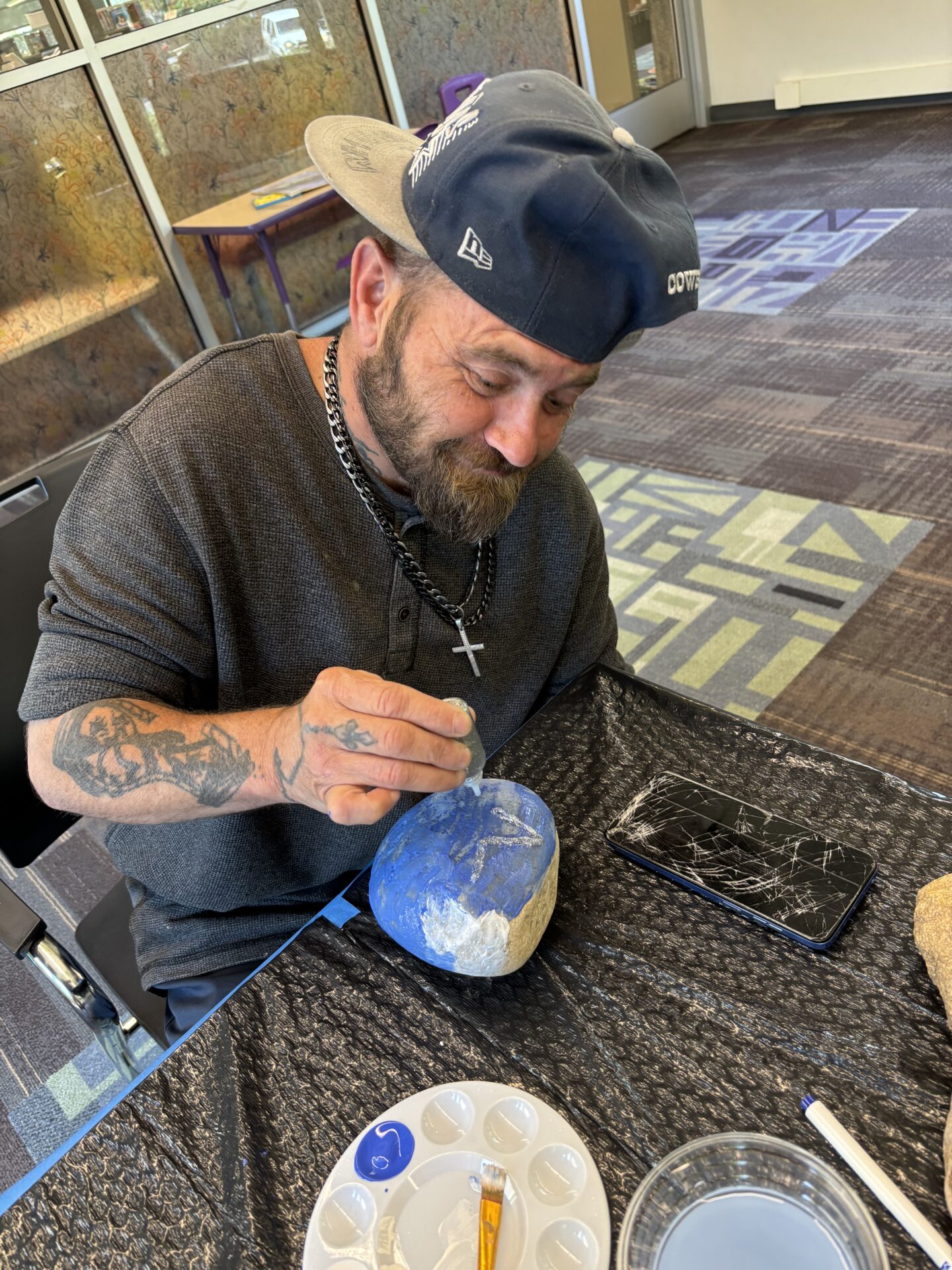 Specific examples of impact include:
Specific examples of impact include:
- A person released from jail with no supports received group and 1:1 OT help (resumé, job search, resource navigation) and obtained employment and connections to housing and education resources.
- Several participants who attended Workforce Wednesday or 1:1 sessions secured jobs
- CSU-OT designed mobile carts stocked with sensory tools, games, and art supplies so caregivers can bring companions and immediately engage them—reducing caregiver stress and improving inclusion. Launched spring 2025.
- An OT capstone student helped develop a staff wellness/rejuvenation room at Old Town Library to help staff decompress after challenging situations in Spring 2025.
Community Action, Inc. of Central Texas
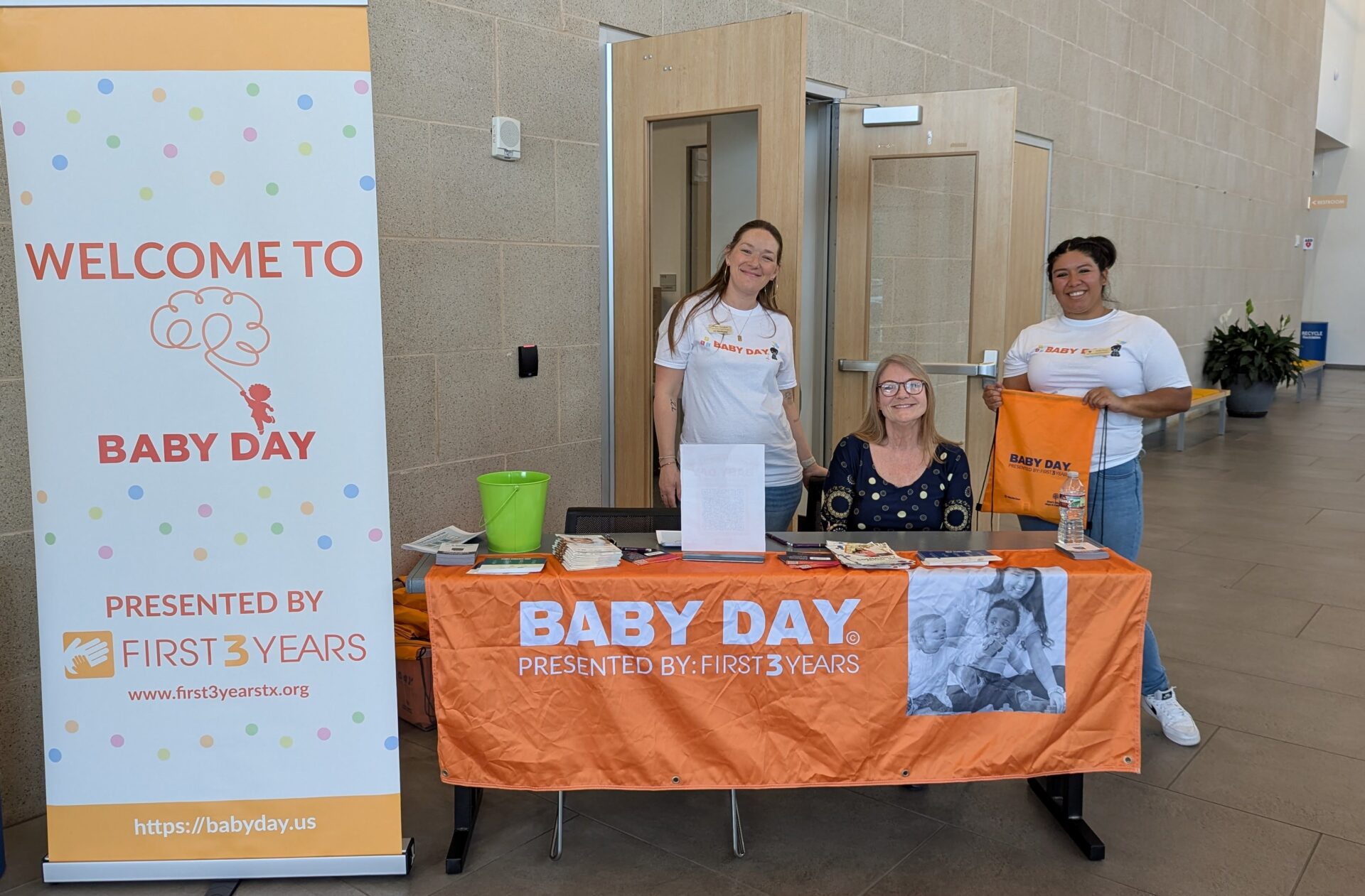 San Marcos Public Library (Texas, pop. 74,316) partners with Community Action, Inc. of Central Texas to host their programs—offering adult education (GED/HSE), ESL, career training, and case management—so residents can access workforce and family supports in a trusted public space. The partnership has been active for approximately 25 years and leverages the library’s accessibility with Community Action’s direct services.
San Marcos Public Library (Texas, pop. 74,316) partners with Community Action, Inc. of Central Texas to host their programs—offering adult education (GED/HSE), ESL, career training, and case management—so residents can access workforce and family supports in a trusted public space. The partnership has been active for approximately 25 years and leverages the library’s accessibility with Community Action’s direct services.
Here’s how it works: The library hosts Community Action’s adult education classes (GED/HSE, ESL, career training) and provides classroom space, books, and logistical support.
Community Action staff and students are regularly in the building. The organizations coordinate outreach, event planning, and referrals so library patrons can be connected to Community Action services the library cannot provide directly.
 Community Action also brings other programs into the library, such as free booster-seat distribution (“Kids in Cars”), Parents as Teachers bilingual storytimes, and child-development information, as well as Digital Navigator one-on-one technology help for seniors and others.
Community Action also brings other programs into the library, such as free booster-seat distribution (“Kids in Cars”), Parents as Teachers bilingual storytimes, and child-development information, as well as Digital Navigator one-on-one technology help for seniors and others.
Through this partnership, the library gains an effective referral pathway and on-site services to meet patrons’ needs beyond what the library alone can provide. It becomes a central hub for education and social services. Community Action gains visibility and daily access to people who need their programs (students walk into the library and can be connected immediately), increasing enrollment and program reach across the nine-county Rural Capital Area.
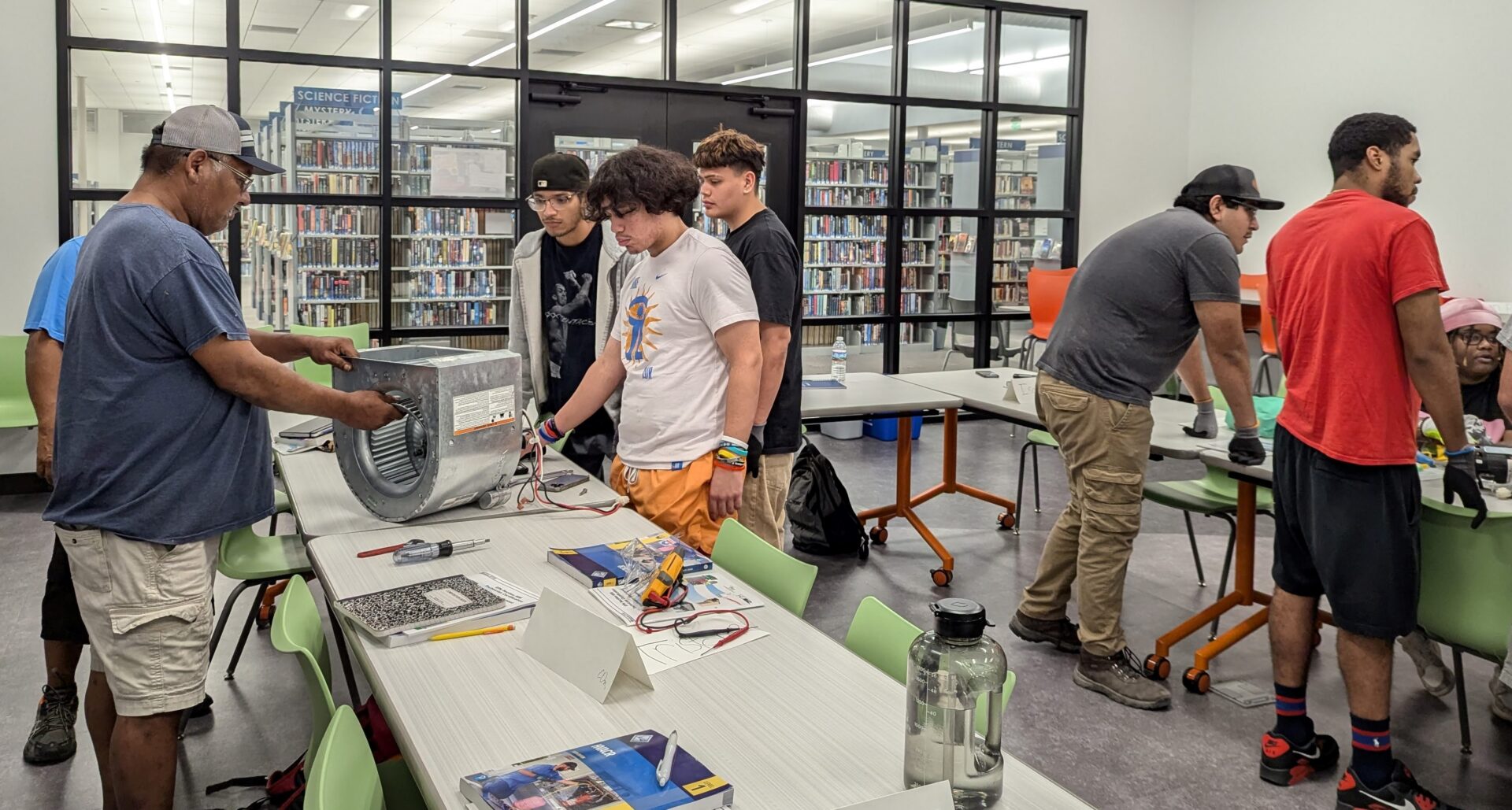 A standout story from the nomination letter is the Career Pathways program, a collaboration between Community Action, Austin Community College, and the library. In February 2025, thirteen students graduated from the Heating, Air Conditioning, and Refrigeration Technology program held right in the library. As Workforce Librarian Deborah Carter put it, “This unique program trains people for good jobs without any cost to them… Their hard work and this great partnership have prepared them for meaningful new careers.” Staff describe countless moments when individuals walk into the library seeking help and leave connected to Community Action programs—whether it’s GED preparation, bilingual storytimes through Parents as Teachers, or a booster seat from the Kids in Cars program.
A standout story from the nomination letter is the Career Pathways program, a collaboration between Community Action, Austin Community College, and the library. In February 2025, thirteen students graduated from the Heating, Air Conditioning, and Refrigeration Technology program held right in the library. As Workforce Librarian Deborah Carter put it, “This unique program trains people for good jobs without any cost to them… Their hard work and this great partnership have prepared them for meaningful new careers.” Staff describe countless moments when individuals walk into the library seeking help and leave connected to Community Action programs—whether it’s GED preparation, bilingual storytimes through Parents as Teachers, or a booster seat from the Kids in Cars program.
The 25-year partnership between the San Marcos Public Library and Community Action, Inc., of Central Texas stands as a model of sustained, embedded collaboration—where education, empowerment, and community care converge daily. Over the years, thousands of residents have advanced their education and improved their quality of life through the free classes held 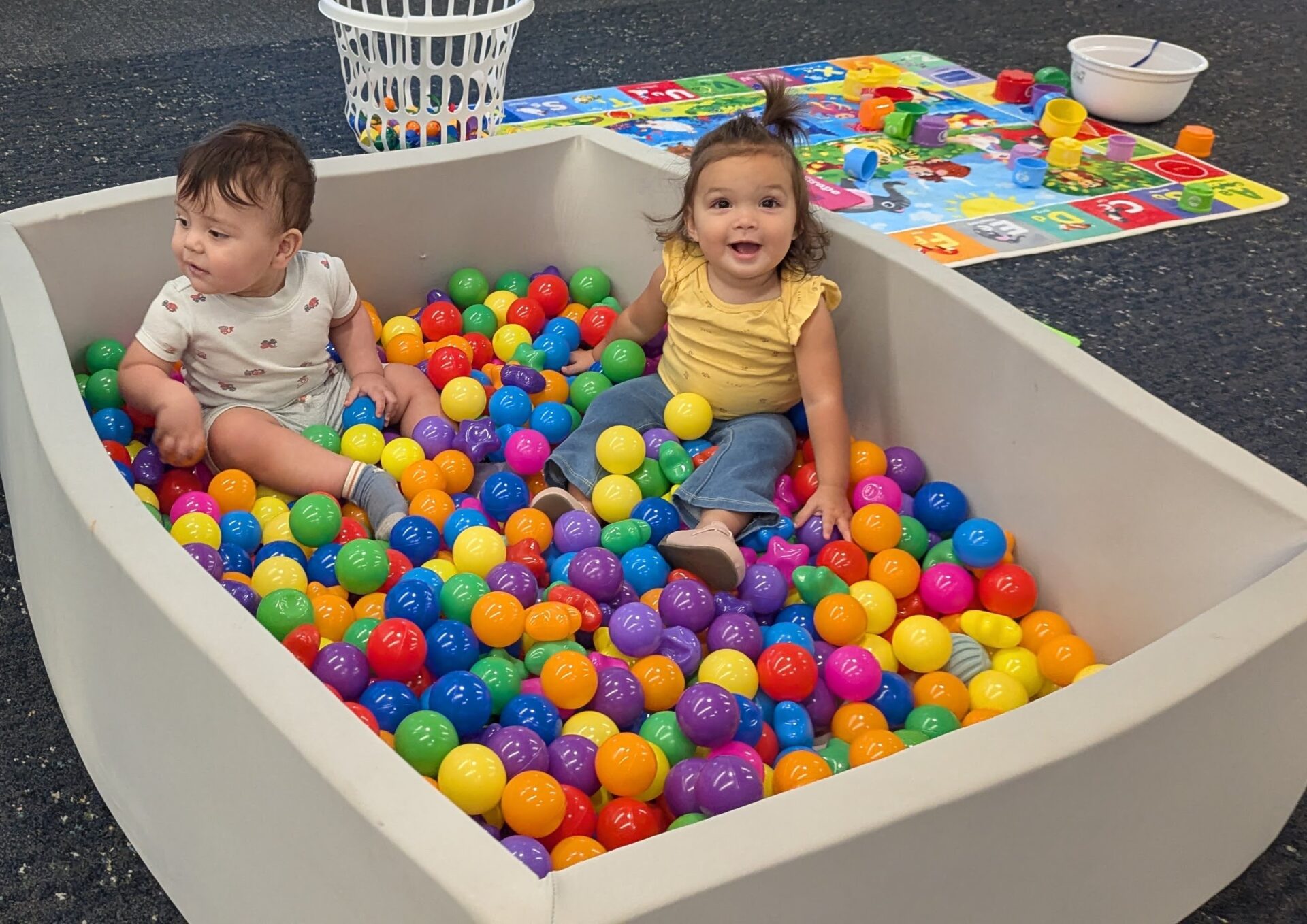 at the library. In 2024–2025 alone, 1,874 students enrolled in GED and job skills classes and 608 took English language courses. Already in 2025, 108 students earned their GED and 159 gained vocational credentials—at no cost to them.
at the library. In 2024–2025 alone, 1,874 students enrolled in GED and job skills classes and 608 took English language courses. Already in 2025, 108 students earned their GED and 159 gained vocational credentials—at no cost to them.
For the library, the partnership expands its ability to help residents beyond traditional library services—connecting people in need to tangible assistance with housing, utilities, and employment. For Community Action, the library provides a trusted and accessible public space where people already come for help, increasing reach and visibility. The relationship allows both partners to serve as a shared front line for community wellbeing, linking information, education, and direct aid.
Geezers in Sneakers Getting Coffee
 Orono Public Library (Maine, pop. 11,183) hosts Geezers in Sneakers Getting Coffee, a volunteer-led walking and social group founded in February 2024 that combats isolation through twice-weekly walks and a follow-up coffee hour. The library supplies coordination support, storage for supplies, and a welcoming space while the group organizes itself through member donations and volunteer tasks. The partnership turns the Orono Public Library into both a health hub and a social commons. It combats isolation through joy, movement, humor, and shared responsibility—demonstrating how libraries can anchor community well-being in even the smallest towns.
Orono Public Library (Maine, pop. 11,183) hosts Geezers in Sneakers Getting Coffee, a volunteer-led walking and social group founded in February 2024 that combats isolation through twice-weekly walks and a follow-up coffee hour. The library supplies coordination support, storage for supplies, and a welcoming space while the group organizes itself through member donations and volunteer tasks. The partnership turns the Orono Public Library into both a health hub and a social commons. It combats isolation through joy, movement, humor, and shared responsibility—demonstrating how libraries can anchor community well-being in even the smallest towns.
The partnership began in February 2024 when an Orono Town Council member encouraged a retired local resident, Harlan Onsrud, to create a walking and social group for older men experiencing isolation. The Orono Public Library became the group’s home base—providing meeting space, staff support, and early-morning access before opening hours. The group as developed welcomes both men and women. The library also helps coordinate scheduling, stores the group’s coffee equipment, and maintains an open-door, collaborative relationship.
The group meets every Monday and Friday, starting from the library for a 30-minute walk through town, followed by a coffee hour in the library’s multipurpose room. While the library provides the space and logistical support, the group sustains itself financially through donations, and organizes its own programming, including talks, potlucks, and community service projects.
 The partnership has also led to community-wide events, such as a “Kids vs. Geezers Race-Walk” event—where children under 12 can earn an “Orono Super Kid… faster than a speeding geezer!” sticker. This event and its spirit embodies the group’s humor and intergenerational engagement.
The partnership has also led to community-wide events, such as a “Kids vs. Geezers Race-Walk” event—where children under 12 can earn an “Orono Super Kid… faster than a speeding geezer!” sticker. This event and its spirit embodies the group’s humor and intergenerational engagement.
The partnership has had strong social, health, and civic impacts:
- For the community: It combats loneliness among older adults and fosters intergenerational connection in a small town with limited indoor gathering spaces. The twice-weekly walks visibly model community engagement and health; townspeople wave and greet them as they pass. The group has become a fixture in Orono’s civic life—hosting public discussions, organizing a winter potluck supper with music, and planning a “Kids vs. Geezers Race-Walk Around the Block” for Orono Festival Day.
 For the participants: Members describe the group as a vital social lifeline that replaced solitude or solitary gym workouts with camaraderie and belonging. The inclusiveness—welcoming men and women of all backgrounds—has created new friendshi ps and mutual support. Notably, no walk has been canceled in over a year and a half, regardless of weather or holidays.
For the participants: Members describe the group as a vital social lifeline that replaced solitude or solitary gym workouts with camaraderie and belonging. The inclusiveness—welcoming men and women of all backgrounds—has created new friendshi ps and mutual support. Notably, no walk has been canceled in over a year and a half, regardless of weather or holidays.- For the library: The group now brings more people to the library each week than any other organization, enhancing the library’s image as a vibrant community hub. Members often check out and return books during visits, increasing circulation. The group’s visibility and civic engagement have also attracted local officials, strengthening the library’s role as a space for community dialogue and leadership.
The group’s “no such thing as bad weather, only bad clothing” motto reflects their spirit. Walks continue through heat, snow, ice, or even “hurricanes or striking meteors,” as the nomination letter cheekily put it.
Their “stone soup” coffee cart story shared in the nomination letter captures the self-sustaining nature of the group. Coffee, milk, and supplies simply “magically appear” at the library through members’ generosity. The library staff describe the group as so responsible that they “wash their own cups and clean the floors” when needed, deepening mutual respect between library and participants.
LivingRoom Community Art Studio
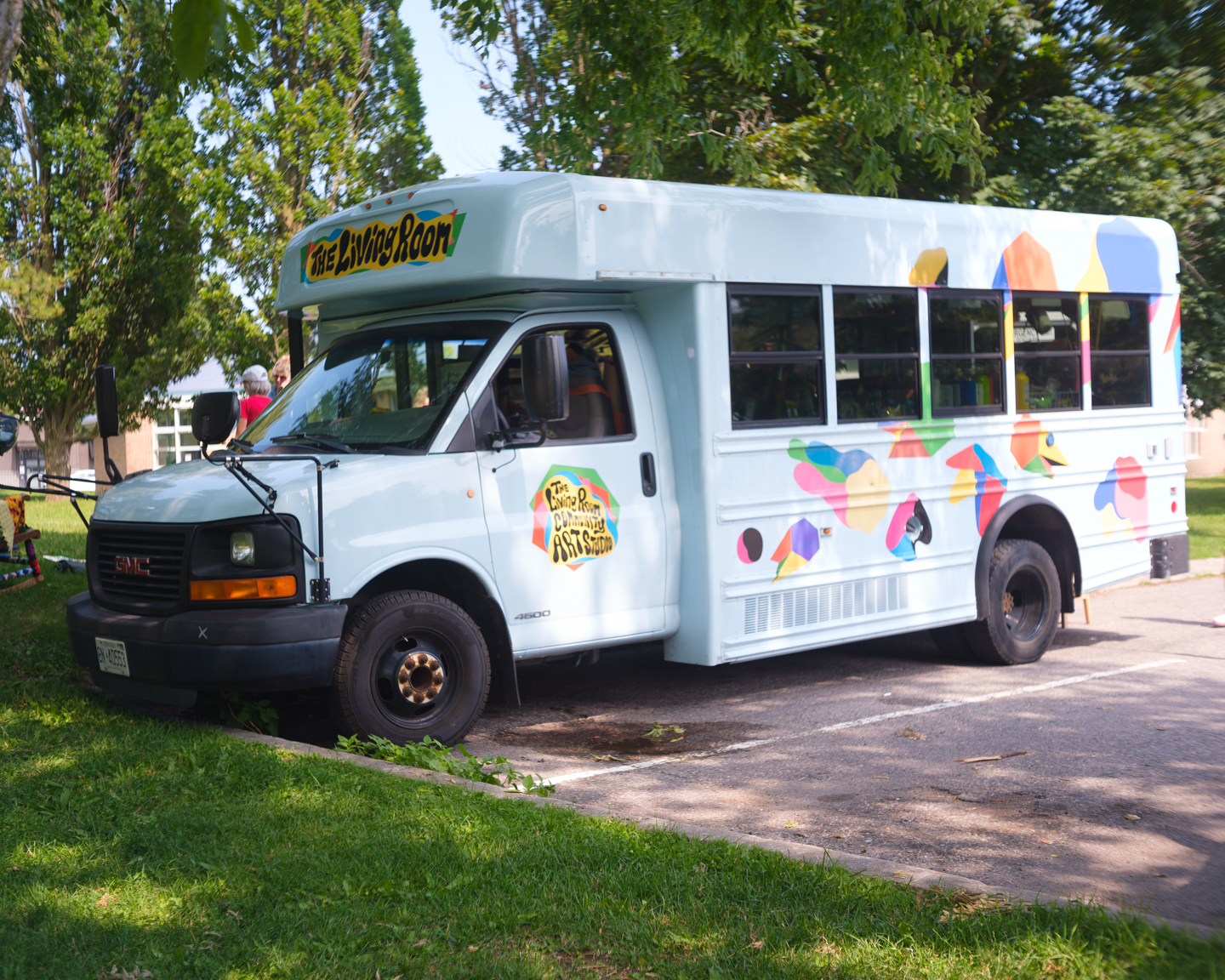 Oshawa Public Libraries (Ontario, pop. 175,383) partners with LivingRoom Community Art Studio in a collaboration (since 2017) that includes drop-in art sessions, pop-up residencies, and a Mobile Art Studio that brings arts experiences to neighborhoods. The partnership reduces barriers to arts participation and supports trauma-informed, intergenerational programming.
Oshawa Public Libraries (Ontario, pop. 175,383) partners with LivingRoom Community Art Studio in a collaboration (since 2017) that includes drop-in art sessions, pop-up residencies, and a Mobile Art Studio that brings arts experiences to neighborhoods. The partnership reduces barriers to arts participation and supports trauma-informed, intergenerational programming.
Features of the partnership include:
- Regular contributions to library initiatives (e.g., Summer Reading Club, Art Spark Afternoons) where LivingRoom provides art facilitation, materials, and creative programming while OPL supplies space, staff support, promotion, and access to community audiences.
- Special programming include weeklong programs (e.g., a 2024 Centennial week at John Aker Northview Branch), mobile outreach via the LivingRoom Mobile Art Studio (a converted bus used at multiple July events), and joint digital/remote projects like the pandemic-era “Listening to Our Neighbours” artworks and soundscapes.
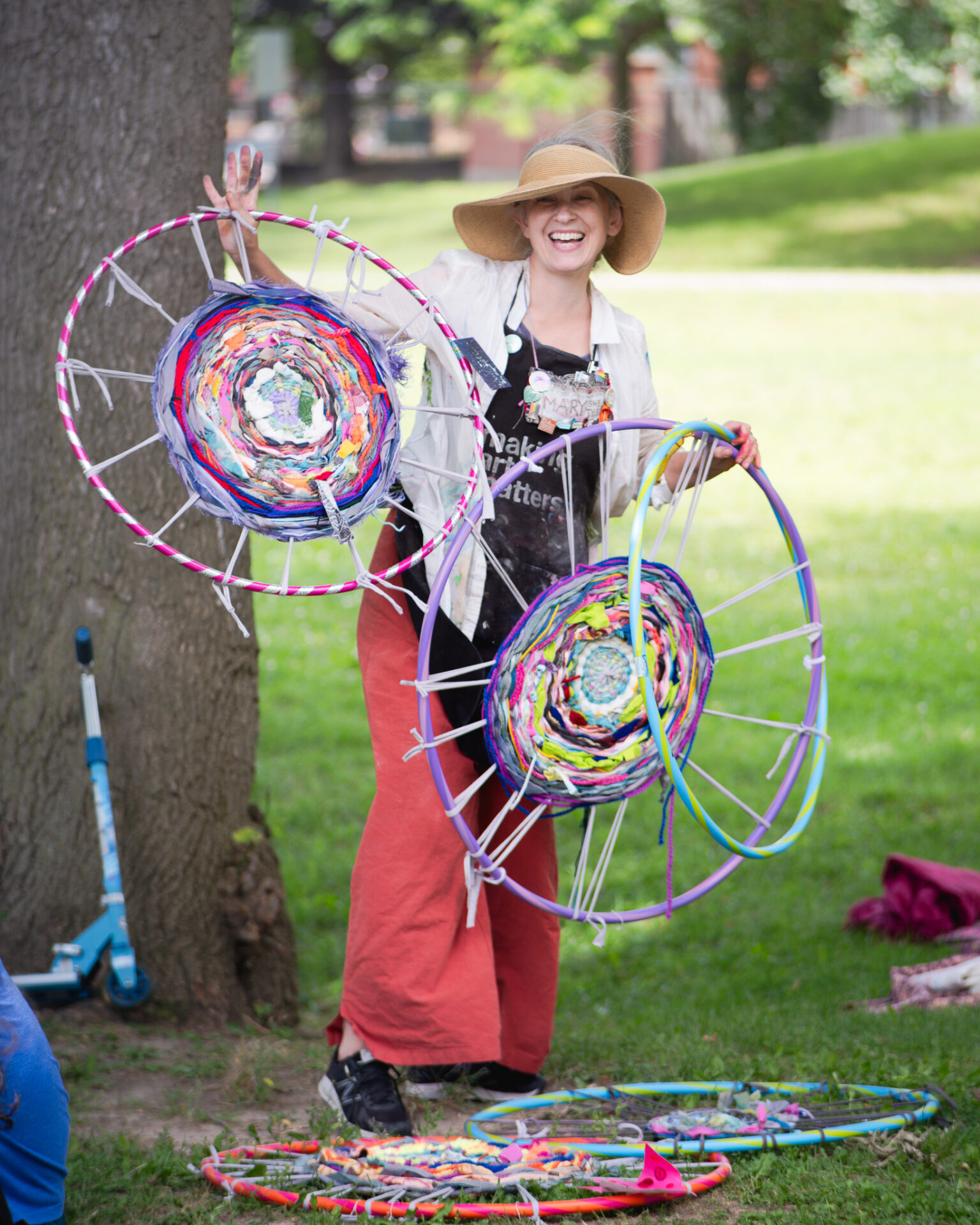 Impacts include:
Impacts include:
- On the community: lowered barriers to arts participation, supported mental wellness and social inclusion, and intergenerational, trauma-informed, low-barrier to entry creative spaces that attract high attendance and foster connection—especially in priority neighborhoods. Programs help participants build creative confidence and strengthen community ties.
- On Oshawa Public Libraries: enriched library programming (making literacy initiatives more interactive and creative), increased community engagement and attendance (e.g., day camps joining branch programs), and broadened the library’s approaches toward participatory, co-created public services.
- On LivingRoom: gained reliable, welcoming venues and promotional reach; deepened ties to neighbourhoods the studio serves; and scaled impact via library audiences and partnerships (the library “feels like home” to LivingRoom staff). The partnership also supported LivingRoom’s pivot to a mobile model when their storefront became unviable, allowing them to continue outreach.
Some of the powerful stories included in the nomination letter include:
- Pandemic pivot & creative resilience: When the storefront was no longer viable during the pandemic, LivingRoom reimagined itself, funded in part by the Ontario Trillium Foundation, and created a Mobile Art Hive (a converted 2009 Chevy bus) to bring art directly into communities. OPL then partnered with that bus for rotating branch programs, especially during the Summer months.
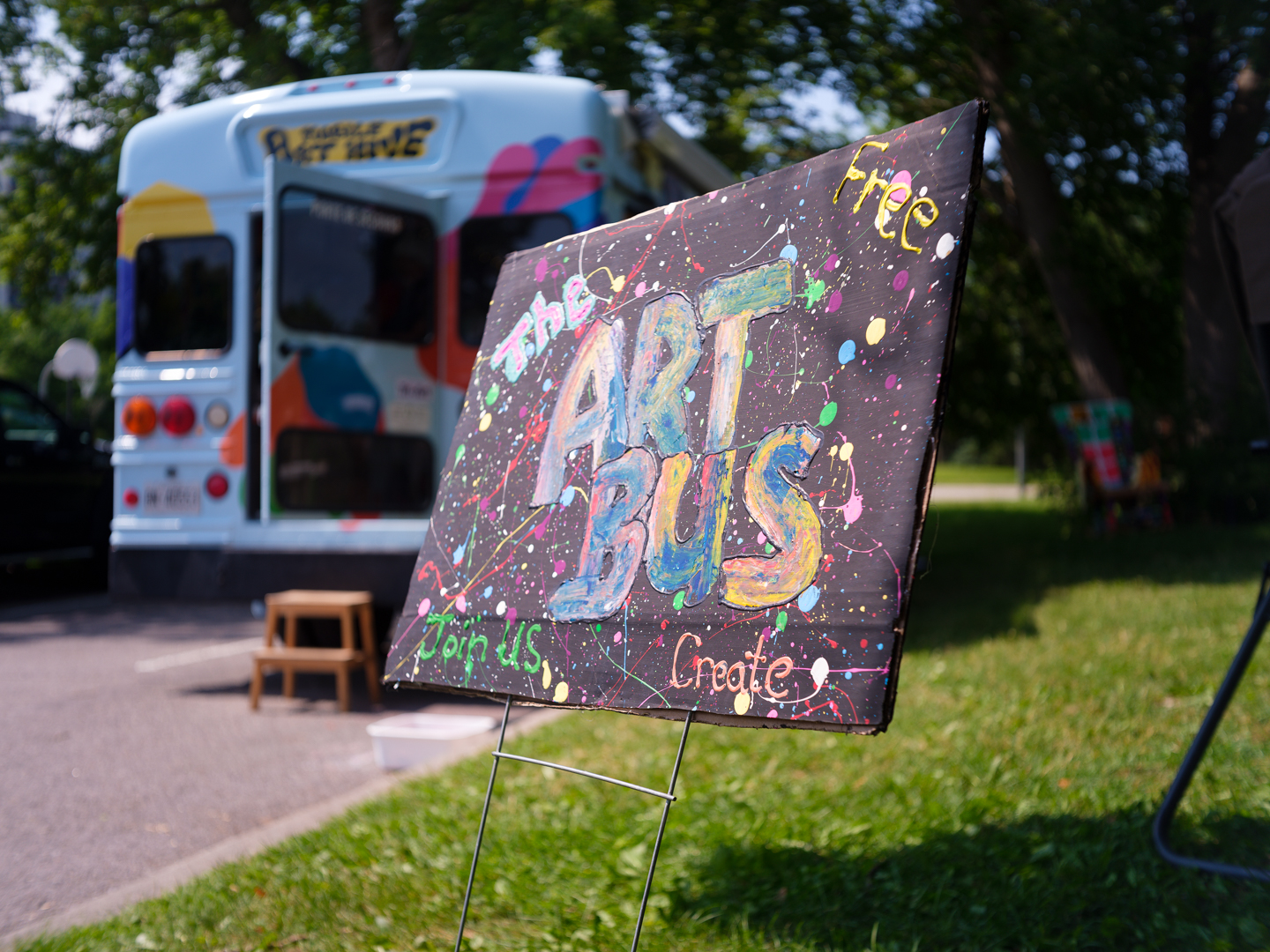 Community-rooted projects: the pandemic “Listening to Our Neighbours” partnership program produced large-scale artworks and soundscapes based on stories from Oshawa’s five priority neighbourhoods—an example of art giving voice to underrepresented communities.
Community-rooted projects: the pandemic “Listening to Our Neighbours” partnership program produced large-scale artworks and soundscapes based on stories from Oshawa’s five priority neighbourhoods—an example of art giving voice to underrepresented communities.- Founder’s delight & relationship warmth: Founder Mary Krohnert enthusiastically accepted being the first guest for OPL’s Community Champions Story Time Series (Fall 2025), replying, “What an incredible honor to be invited to participate in this series! (Seriously—a dream come true!) Count me in! Your library feels like home to us.” That quote captures the genuine, reciprocal affection between partners.
Mackenzie Health
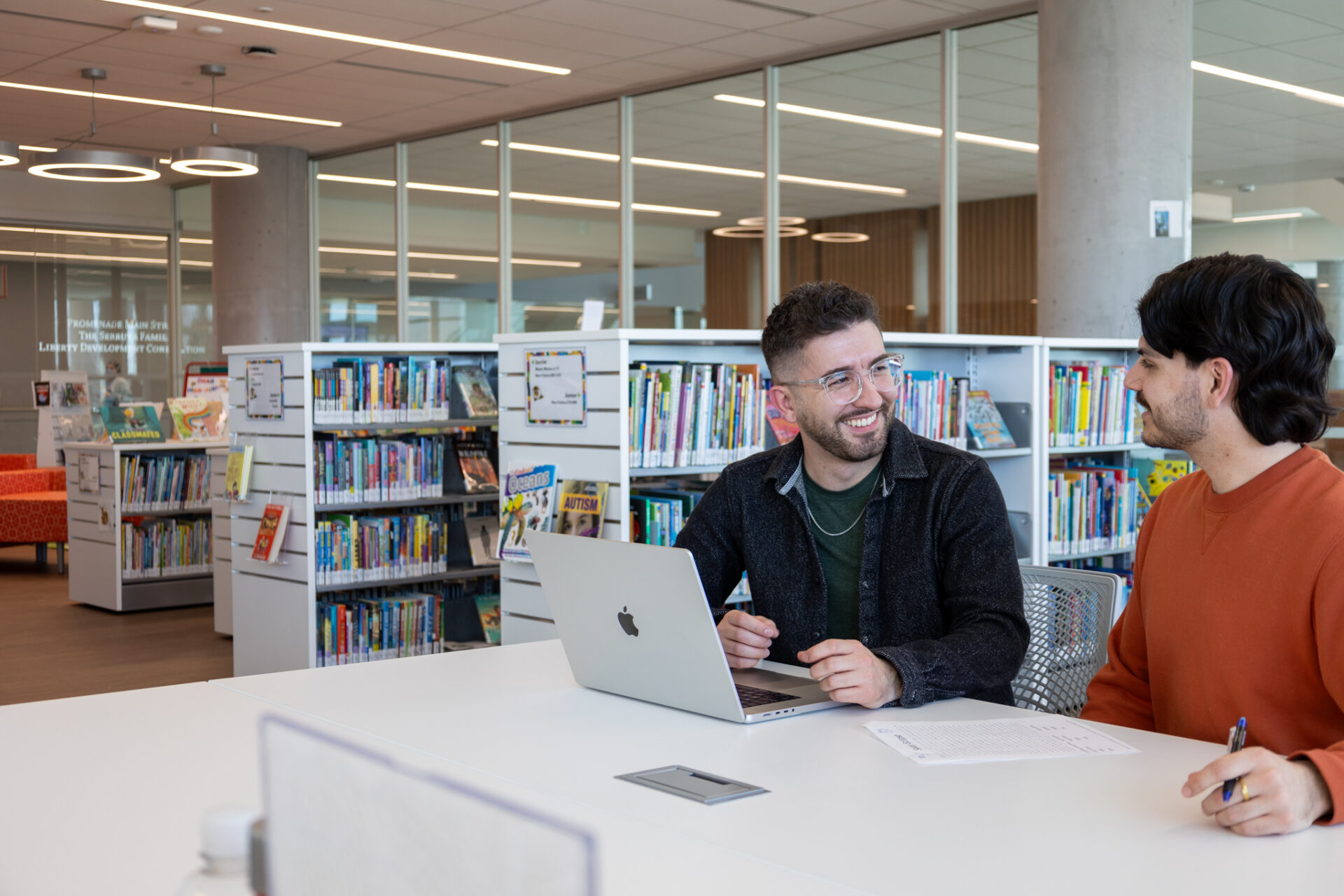 Vaughan Public Library (Ontario, pop. 323,103) and Mackenzie Health / Cortellucci Vaughan Hospital co-designed a 4,000 sq ft hospital-based library branch that serves patients, families, and neighborhood residents. The partnership (initiated in 2017, formalized in June 2021) provides tailored recovery resources, clinician research support, and outreach that extends library services into clinical care.
Vaughan Public Library (Ontario, pop. 323,103) and Mackenzie Health / Cortellucci Vaughan Hospital co-designed a 4,000 sq ft hospital-based library branch that serves patients, families, and neighborhood residents. The partnership (initiated in 2017, formalized in June 2021) provides tailored recovery resources, clinician research support, and outreach that extends library services into clinical care.
The 4,000 sq ft Vaughan Public Library (VPL) branch in the Cortellucci Vaughan Hospital is both a community library and a therapeutic, restorative space for patients and families — extending library reach into clinical care and local neighborhoods.
The partnership has had concrete, measurable benefits for patients, clinicians, and families. Examples include tailored stroke-recovery resources (cognitive kits, dexterity activities), an evidence-search service for clinicians, targeted mental-health in-unit programming, and the distribution of ~3,400 Welcome Baby kits each year that connect new parents to early-literacy supports.
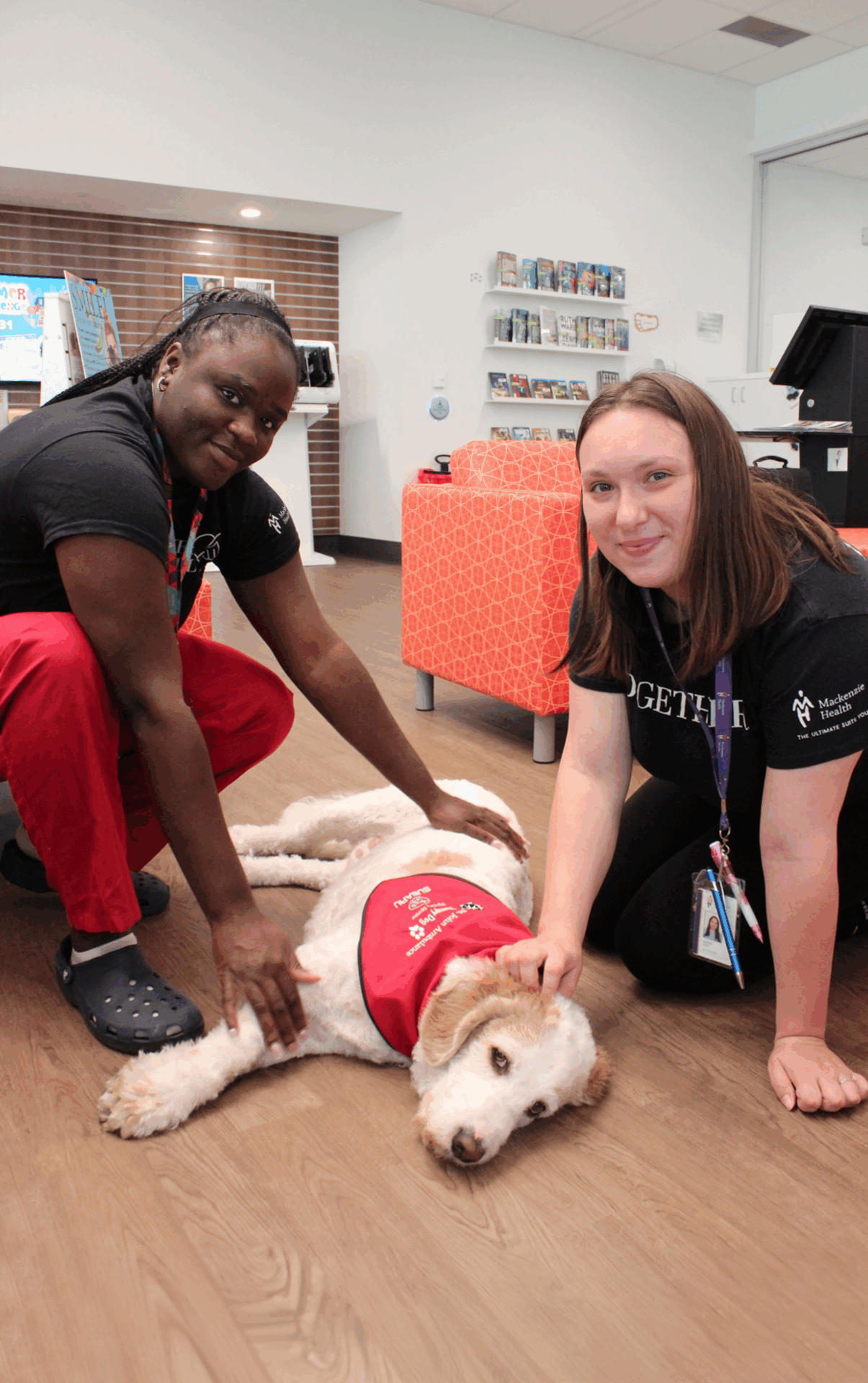 This is more than a library located in a hospital. It is also a rich partnership with shared responsibilities that have enabled steady growth. A formal Memorandum of Understanding (MoU) and regular coordination (at least monthly) allow the partners to co-design spaces and services, track outcomes (program counts and attendance), and adapt outreach to units that can’t easily leave the hospital — producing clear community and institutional gains.
This is more than a library located in a hospital. It is also a rich partnership with shared responsibilities that have enabled steady growth. A formal Memorandum of Understanding (MoU) and regular coordination (at least monthly) allow the partners to co-design spaces and services, track outcomes (program counts and attendance), and adapt outreach to units that can’t easily leave the hospital — producing clear community and institutional gains.
The partnership was initiated in 2017 (design approved mid-2018) and formalized in June 2021.
Impacts on the community and on the two partners
- Expanded access: The hospital branch serves an area of roughly 25,600 people / 7,000 households not previously served by a branch and sits within walking distance of several schools, increasing neighborhood access.
- Health literacy & patient support: Patients and families can access curated health information about diagnoses and treatment plans. The library also functions as a respite/sanctuary inside the hospital. Former patients report these resources are extremely appreciated “in their moment of need.”
- Outreach outcomes: Since 2023 VPL has delivered 41 outreach presentations to inpatient mental health patients, reaching 366 people; schools have brought classes, demonstrating strengthened community ties. Through the partnership, the hospital can also extend outreach into the community through off-site stroke/heart-health presentations and outreach tables.
- Increased library capacity: VPL developed a health research reference service for clinicians (access to scholarly articles, literature searches) that positions the public library as an expert in health literacy.
- Increased referrals to the library: In addition to ensuring that all new families learn about the library through Welcome Baby Kits that contain the child’s library card and Born to Read information, clinicians promote the library to patients in general. When possible
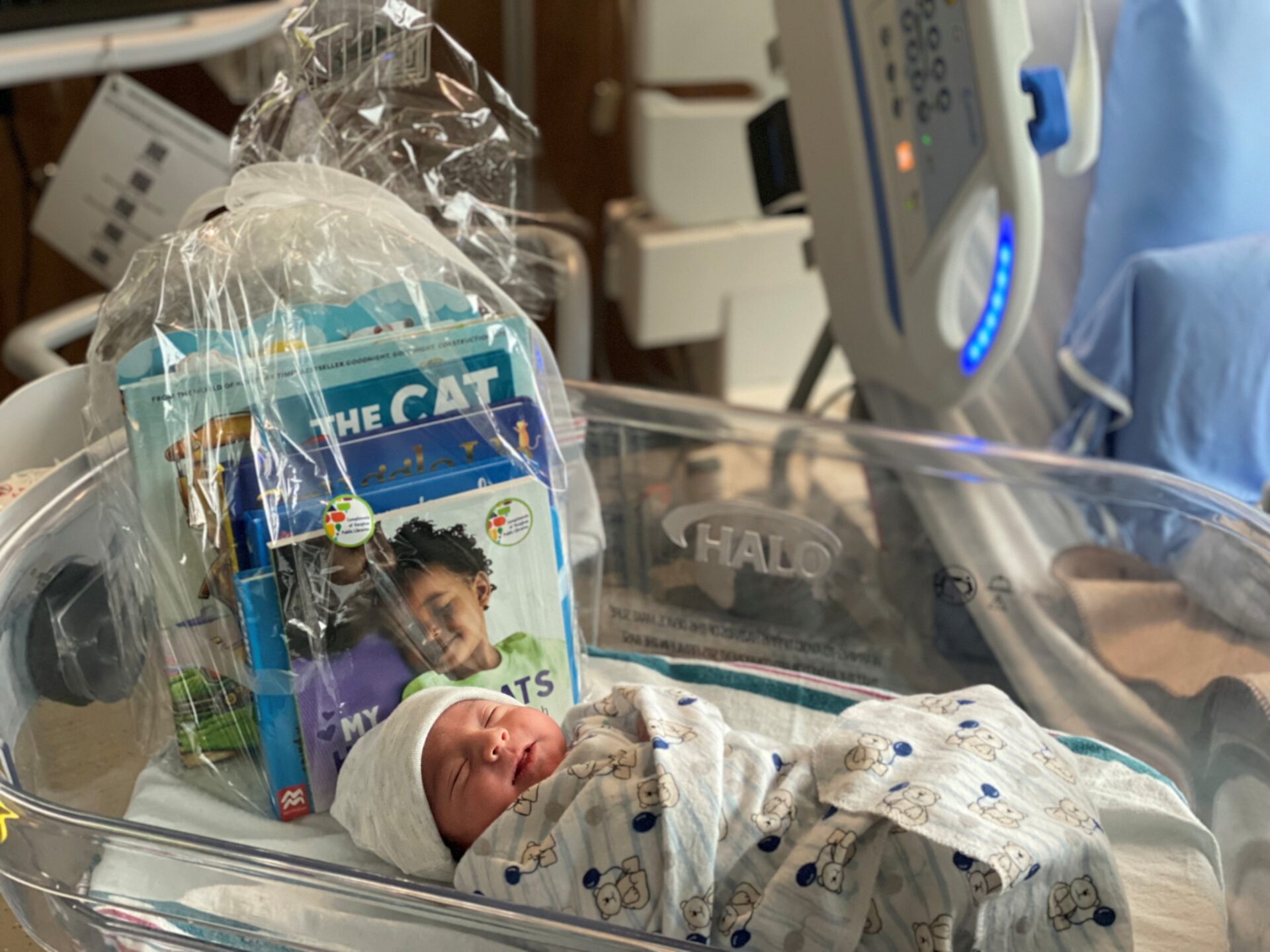 patients visit the library for a change of scenery and use tailored recovery resources (cognitive care kits, dexterity games). Furthermore, a children’s author visit (Ruth Ohi) drew 90 students walking to the hospital-library for the event, highlighting how the branch acts like a local community hub, not just a hospital amenity.
patients visit the library for a change of scenery and use tailored recovery resources (cognitive care kits, dexterity games). Furthermore, a children’s author visit (Ruth Ohi) drew 90 students walking to the hospital-library for the event, highlighting how the branch acts like a local community hub, not just a hospital amenity.
Plenty! Farm & Food Bank
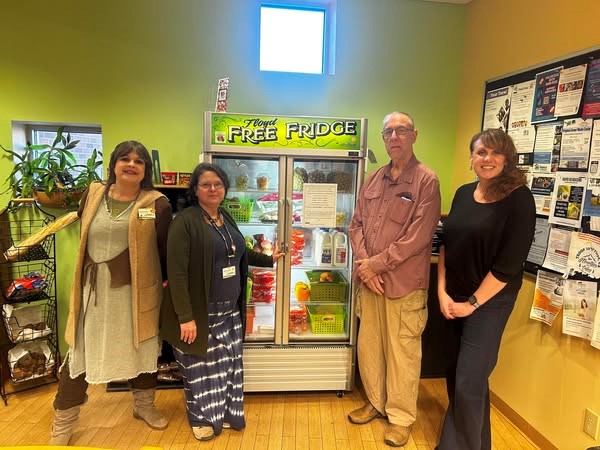 Jessie Peterman Memorial Library (Floyd, Virginia, pop. 448) partners with Plenty! Food Pantry to host the Floyd Free Fridge, a visible daily food-access point that opened on June 24, 2022 and extends fresh food access when the pantry is closed. The library provides the site and public visibility while Plenty! manages food sourcing and distribution.
Jessie Peterman Memorial Library (Floyd, Virginia, pop. 448) partners with Plenty! Food Pantry to host the Floyd Free Fridge, a visible daily food-access point that opened on June 24, 2022 and extends fresh food access when the pantry is closed. The library provides the site and public visibility while Plenty! manages food sourcing and distribution.
The two partners coordinate complementary food services, creating a visible, daily food-access point that expanded service hours, drew new people into the library, and deepened community care.
The library and Plenty! opened the Floyd Free Fridge together, with the fridge officially opening June 24, 2022. The partners started working together a year earlier to come up with the plan and to work out logistical details.
The fridge sits at the library, and is stocked and maintained as part of the partner’s shared efforts to get fresh food to people when the pantry may be closed or inaccessible.
The partners coordinate volunteers, time, and services so the library’s hours extend Plenty!’s reach.
The relationship is ongoing and mission-aligned. Each organization sticks to its strengths (the library as a community hub and Plenty! as a food provider), while collaborating on programs and outreach that are mutually beneficial and impactful in the community.
 Impacts of the partnership include:
Impacts of the partnership include:
- The library gained new patrons and greater foot traffic. The fridge brought people into the library who had never visited before and created opportunities for connection and follow-up service.
- Several patrons have become emotional sharing how meaningful access to fresh food is for them—a powerful, human evidence of impact.
- A patron adopted the fridge as a volunteer role. One community member now stops by daily to clean, rearrange, and care for the fridge area — she says it’s her way to give back. That single act illustrates how the fridge became a focal point for community pride and ownership.
- Grant unlocked by the partnership. Because the fridge partnership demonstrated impact, Plenty! received funding enabling monthly grocery distributions for participants in the local recovery court — a concrete programmatic win born from the collaboration.
The library summed up the relationship in its nominating letter: “The library and Plenty! have a wonderful working relationship. Both parties care deeply about our community. We have a common goal and work together to ensure that, although, we offer different services, that our partnership remains true to both of our missions. The library also nourishes the community, in the way that libraries do, but we also nourish that community with food that they may not have had without Plenty!’s help.”
The Sharing Place
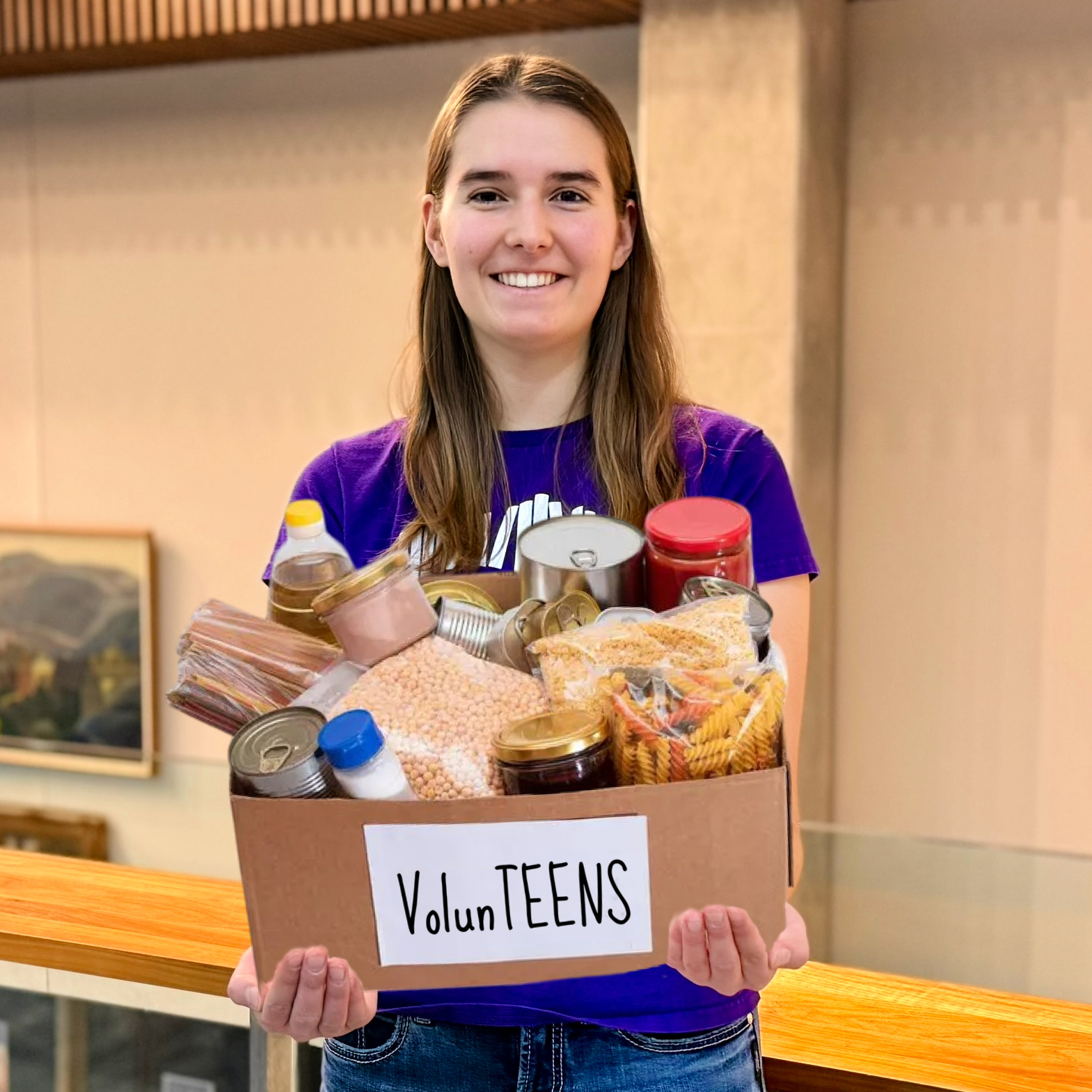 Orillia Public Library (Ontario, pop. 33,411) partners with The Sharing Place to host school-break food distribution (Winter, March, Summer), extending the school fuel program into a public, stigma-free setting. The collaboration expanded during the pandemic and now includes donation drives and shared resource distribution. It has since grown and deepened through regular communication and open collaboration.
Orillia Public Library (Ontario, pop. 33,411) partners with The Sharing Place to host school-break food distribution (Winter, March, Summer), extending the school fuel program into a public, stigma-free setting. The collaboration expanded during the pandemic and now includes donation drives and shared resource distribution. It has since grown and deepened through regular communication and open collaboration.
In addition to the signature food distribution program, these Ontario partners run donation drives together (e.g., winter food/product drive). They also share resources: the library created Period Kits (from a grant) and supplied most of those to The Sharing Place for distribution, later The Sharing Place returned excess menstrual products for use in library washrooms. In this and in other ways, the partnership strengthens both organizations’ capacity to respond to community need, support cross-referral, and mutual promotion.
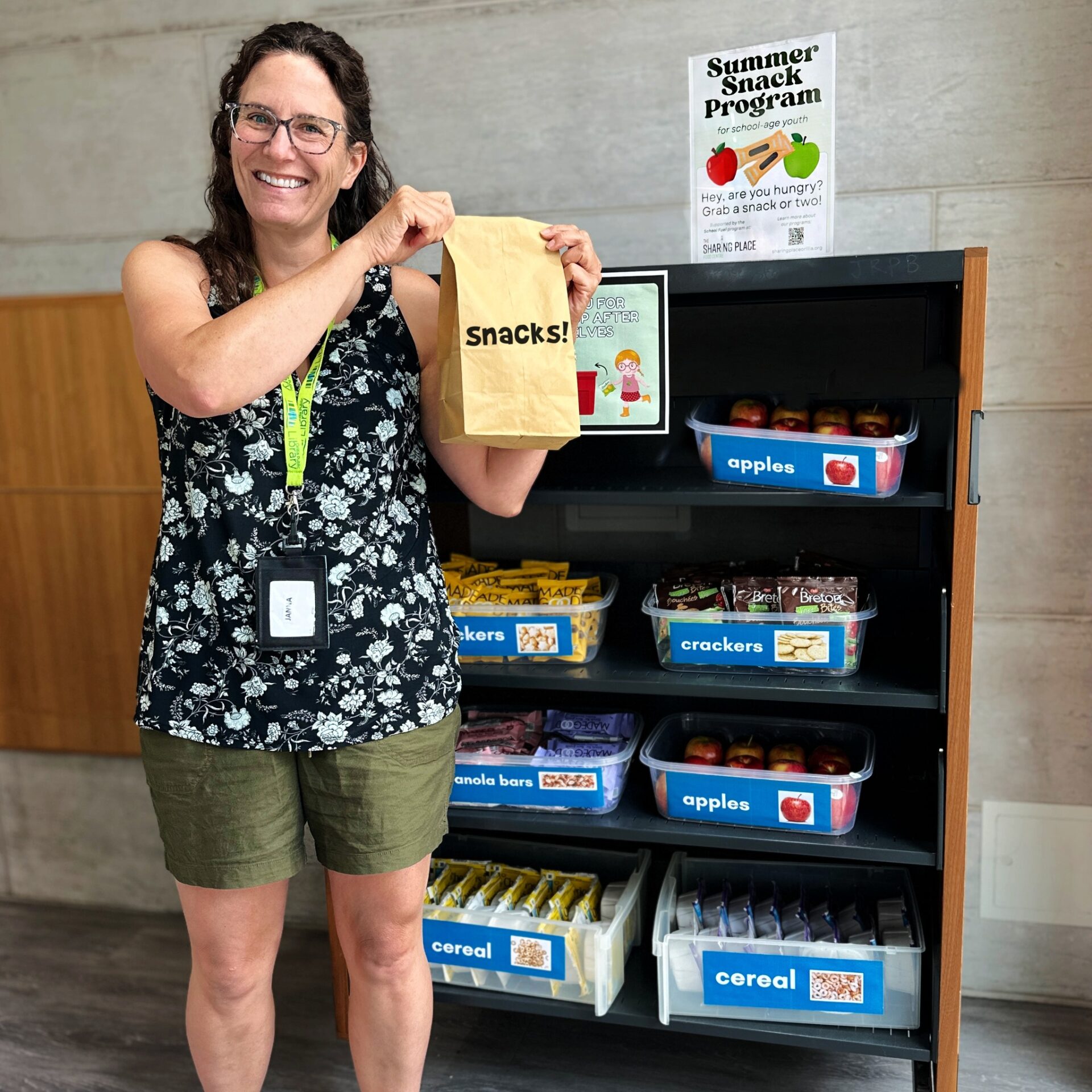 Impacts of the partnership include:
Impacts of the partnership include:
- Directly addressing food insecurity by extending school snack access when school is out, so children keep getting nutritious food year-round.
- The program removes stigma associated with needing food by operating openly and without any requirements.
- More families discover and use the public library because of the food access point.
- Having snacks available de-escalates hunger-related behaviours that in the past had led to issues and incidents in the library. The partnership creates pathways for families to remain in and enjoy the library and gives staff a tangible resource to offer struggling patrons.
- The library provides continued access points for the school fuel program, raises awareness (and donors) through library touchpoints, and helps broaden distribution reach, all benefits to The Sharing Place’s mission.
Valley Program for Aging Services
 Waynesboro Public Library (Virginia, pop. 22,196) partners with Valley Program for Aging Services (VPAS) to reduce senior isolation and expand dementia-aware programming. The partnership (since 2023) combines VPAS’s outreach and meal routes with the library’s mobile and virtual programming to reach homebound seniors and people living with dementia. The partnership enables enables the two organizations to extend connection, empathy, and access across the older-adult community.
Waynesboro Public Library (Virginia, pop. 22,196) partners with Valley Program for Aging Services (VPAS) to reduce senior isolation and expand dementia-aware programming. The partnership (since 2023) combines VPAS’s outreach and meal routes with the library’s mobile and virtual programming to reach homebound seniors and people living with dementia. The partnership enables enables the two organizations to extend connection, empathy, and access across the older-adult community.
Nominators praised VPAS as “yes” people who try evidence-backed ideas (e.g., Tai Chi in the library, Book Delivery, Virtual Dementia Tours), making collaboration easy and inventive.
Especially impacted by the partnership have been homebound seniors and people living with dementia — through programs, outreach, staff training, and shared referrals.
Specific manifestations of the partnership include:
- Book Delivery via VPAS meal routes. Since March 2025, VPAS meal volunteers deliver library tote-bags and sign-up packets to homebound seniors so WPL can issue cards and loan books to people they otherwise couldn’t reach.
- Book Bike outreach. Library staff bring their book bike to VPAS events/outreach, signing up new cards and circulating materials in community locations.
- Joint programs at the VPAS Senior Center. WPL provides virtual travel programs and other activities at the VPAS center.
- Dementia-related collaboration and training. VPAS and WPL teamed up for Second Wind Dreams’ Virtual Dementia Tour (public and staff sessions), VPAS provided Dementia Friendly training to WPL staff, and WPL’s director trained further to become a Dementia Champion and serve on the Dementia Steering Committee.
- Information and resource referrals. The organizations exchange referrals (e.g., VPAS points people to library programs and WPL refers seniors to VPAS services such as respite vouchers and caregiving support).
Impacts of this multi-faceted partnership include: 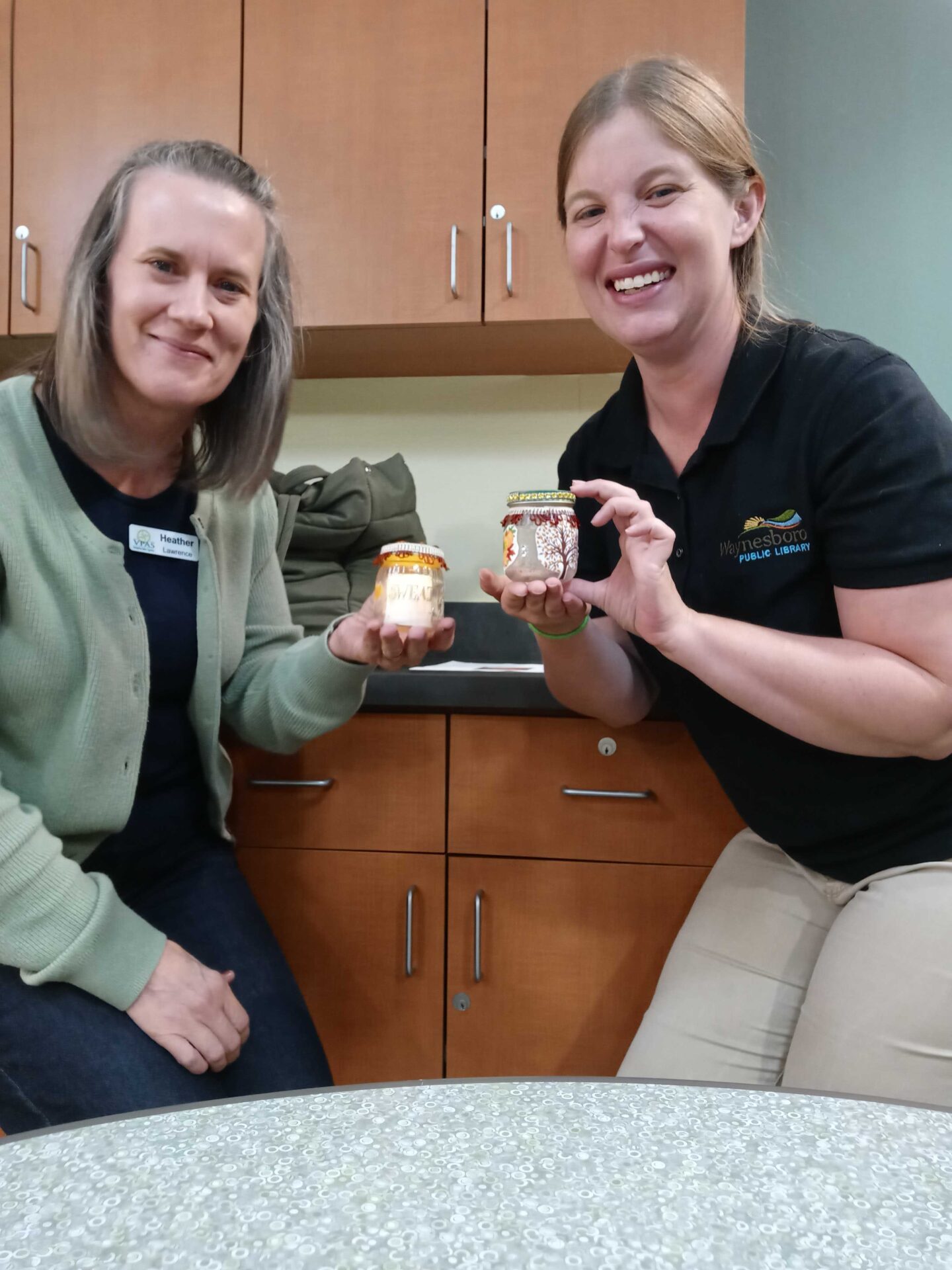
- Reduced isolation and increased connection. Homebound seniors get books and invitations back into civic life. For example, a homebound woman reconnected with the community through participation in library services discovered through the partnership. Furthermore, a program attendee living with dementia attended a virtual travel session and remembered living in Taiwan years earlier; she joyfully talked about favorite parts of that time.
- Expanded access. Seniors who can’t travel now receive library materials and program access at home or at the VPAS center (books, virtual programs, e-resources).
- Increased engagement. Outreach events produce new library card sign-ups. For instance there were 18 participants and 5 new cards at a 2025 outreach event.
- Greater dementia awareness — Virtual Dementia Tour and trainings increased empathy and practical understanding for caregivers, health professionals, students, and family members. This awareness has rippled out into the community: Family caregivers dementia-related programming has helped them understand behaviors, while health students and professionals said it improves how they provide care.
The Waynesboro Public Library has gained new patrons (homebound and outreach attendees), built staff capacity to serve people with dementia (now a Dementia Friendly Library), and expanded program offerings into senior-centered settings.
The Valley Program for Aging Services broadened social and cultural services for their clients by offering library materials and programming, reinforcing their role as a hub connecting seniors to resources. The partnership even led the Virginia Department for Aging and Rehabilitation to conclude after a recent site visit to VPAS that “They were amazed at the various programs going on” made possible by the partnership.
Application and review process
A team of 27 expert reviewers from 20 states and provinces in the USA and Canada convened during the month of September to examine 36 nominations submitted during Summer 2025 by public libraries in 20 states and provinces in the USA and Canada.
These annual awards were started in 2023 after a three-year national (U.S.) study determined that the most impactful public library initiatives require strong community partnerships with a wide range of collaborators. We’re thrilled to shine a light on library partnerships through this endeavor.
Who reviewed in 2025?
We want to thank the following experts for taking the time to review nominations in 2025. We will be seeking volunteer reviewers in 2026 beginning in May, 2026.
- Alice Mackey Delaware County District Library Ohio USA
- Alicia Schwarzenbach Ascension Parish Library Louisiana USA
- Amy Kendrick University of North Carolina at Greensboro University Libraries North Carolina USA
- Carolyn Freedman The Charlie Cart Project California USA
- Cora Schaeff Sarasota County Libraries Florida USA
- Damiana Fortenberry University of Alabama at Birmingham Libraries Alabama USA
- Diane Palmieri Marshall University Libraries West Virginia USA
- Elizabeth Warren Denver Public Library Colorado USA
- Fiona Johnson Beaufort County Library South Carolina USA
- Glenda Puckett Lois Nelson Public Library (Princeton) Texas USA
- Jeff Graveline University of Alabama at Birmingham Libraries Alabama USA
- Jennifer Park Ramapo Catskill Library System New York USA
- Julie Althaver Boone County Public Library Kentucky USA
- Kelly Weigand Auburn University Libraries Alabama USA
- Keri Gould Prince William Public Libraries Virginia USA
- Mara Whitman Bloomfield Public Library Connecticut USA
- Margie Sheppard Network of the National Library of Medicine, Region 3 Kansas USA
- Megan Bell University of Alabama at Birmingham Libraries Alabama USA
- Megan Weis SC Center for Rural and Primary Healthcare South Carolina USA
- Michah Followay Kentucky Department for Libraries and Archives Kentucky USA
- Miriam Rosen Evanston Township High School Illinois USA
- Miriam Tuliao Penguin Random House New York USA
- Paula L. Brown Gaston County Library North Carolina USA
- Rachel McDonald Pierce County Library System Washington USA
- Rhonda Jessup Whitby Public Library Ontario Canada
- Sara Tekavec Elkins Park Free Library, Cheltenham Township Library System (CTLS) Pennsylvania USA
- Scott Businsky Route 9 Library & Innovation Center (New Castle) Delaware USA
About Let’s Move in Libraries
Since 2016, the non-profit organization Let’s Move in Libraries has been a national and international voice advocating for strengthened partnerships between public libraries and others that want our communities to be healthier places for all. Through this work, we have seen that public libraries can do a lot to promote health, but this health promotion work is almost always made possible by community partners and community collaborators. Recognizing a gap around this topic, in 2023 Let’s Move in Libraries launched the annual I Partner with My Public Library Award to begin the process of creating a platform to celebrate and acknowledge the crucial work of community collaborators to the work of public librarianship. This award is open to all partners, not only those focused on health promotion.
